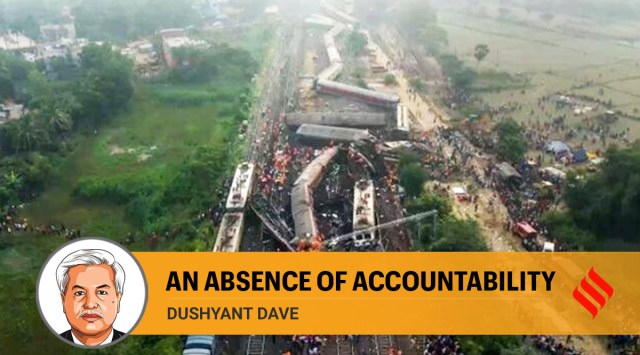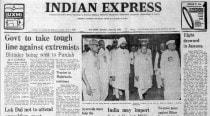Dushyant Dave writes: Odisha train tragedy shows Modi government rewards mediocrity
Odisha train tragedy underlines the problem of governance failure. Mediocrity is rewarded, excellence is a casualty
 . No one spares a moment to find out how major debacles like the Kargil infiltration, the 2008 terror strike in Mumbai, the Pulwama attack, and now the Odisha tragedy occurred, resulting in citizens losing their lives. (Express Photo)
. No one spares a moment to find out how major debacles like the Kargil infiltration, the 2008 terror strike in Mumbai, the Pulwama attack, and now the Odisha tragedy occurred, resulting in citizens losing their lives. (Express Photo) The tragic and avoidable loss of nearly 300 lives and injuries to hundreds more in the Balasore train tragedy should shake the nation to its core. But we in India are used to such tragedies being in the news for a couple of days, followed by VVIP visits to the site and then complete silence, as if nothing has happened. But what about the lifelong suffering of families who have lost their breadwinners, leaving them in abject poverty?
As a nation, we are very forgiving of such man-made tragedies. No one spares a moment to find out how major debacles like the Kargil infiltration, the 2008 terror strike in Mumbai, the Pulwama attack, and now the Odisha tragedy occurred, resulting in citizens losing their lives. Who failed us? Was any punitive action taken against those who failed? What corrective steps were taken?
Every such tragedy or debacle is either converted into some kind of victory or simply buried in inquiries and commissions. One singular achievement that we as a nation have is the complete absence of accountability. We never analyse the crisis or introspect. We just move on. No one questions it, there is no public debate and there is no valid explanation from those who govern us. How long should this go on?
Governance is the biggest victim in our country in the last many decades. Parliamentary democracy was chosen over the presidential form of government by those who framed our Constitution, because as B R Ambedkar said, it is more responsible. We elect our government and our Parliament or Assemblies, hoping for strong supervision and accountability of our public servants. We want our Prime Minister and his cabinet ministers to be efficient, honest, hardworking, and responsible as well as responsive. But are they?
Governance does not come from publicity, media coverage, political rallies, rhetoric, and raw use of power or from showmanship.
For nine years, the PM has been busy talking about the Vande Bharat trains, the modernisation of railway stations, the Sagarmala and Bharatmala projects, high-speed trains, freight corridors, and even bullet trains. But has the PM talked about the real challenge before the Railways?
In an audit conducted in 2021-22, the Comptroller and Auditor General of India found that from 2017-18 to 2020-21 there was a serious issue of derailment of trains. There were shortfalls in inspections by track recording cars, ranging from 30 to 100 per cent. A total of 422 derailments were attributed to the Engineering Department, with a major factor responsible for derailment being the lack of maintenance of tracks, as seen in 171 cases. This was followed by “deviation of track parameters beyond permissible limits” in 156 cases. In 182 cases, derailment was attributed to the Mechanical Department.
What about other safety measures? The CAG reported in 2022 that Indian Railways spent more than Rs1 lakh crore on the Rashtriya Rail Sanraksha Kosh (RRSK) in the last five years alone to improve rail safety. So where has this money gone?
On April 1, when flagging off the Vande Bharat Express between Bhopal and New Delhi, the PM had said, “Today, Indian Railway has become much safer. The ‘Made in India’ Kavach Train Protection System is being expanded in Railways to strengthen passenger safety.” But as per the Ministry of Railways, as on April 8, 2022, only 1,445 RKM of the network route in South Central Railways was brought under Kavach. So much for passenger safety!
The PM is right in saying that “Indian Railways is actually the transport of the ordinary Indian family.” So why neglect ordinary Indian families while thousands of crores are spent on VVIP safety in buying planes, helicopters, cars, and arms? Governance has become VIP-centric, moving far away from the common man.
India is facing another challenge. Excellence is now a victim, and mediocrity is rewarded. Public servants, however incompetent they may be, are chosen to manage important positions if they can curry favour with their political masters. To run such a great institution as the Railways, highly competent, qualified, independent, and dedicated officials and workers are needed. Trains are machines that acquire life because of the men who control and operate them. Today, more than ever, it needs a set of honest persons who will put the interest of the people before their own.
In 2014, the BJP promised “good governance”, an “open government and accountable administration”. It said, “Administrative reforms will be a priority for the BJP… Every effort will be made to meet the development aspirations of the people and make government agencies accountable to citizens.”
In 2019, the BJP promised “Prime Minister Shri Narendra Modi has always maintained that good governance is the cornerstone of good politics” and promised civil services and governance reforms for “minimum government and maximum governance.”
So why is there no accountability for any failures of the last nine years, including the Odisha accident? It is easy to avoid the issue by asking the CBI to investigate. But if there was a crime why was no intelligence input available? What was the Home Ministry doing? Why was the intelligence bureau silent? Why not act against them for such gross criminal negligence?
India needs to change, but this can happen only if we the people of India decide to change. Till then, our elected and beloved leaders will continue to keep us in the dark.
The writer is a Senior Advocate in the Supreme Court of India








































